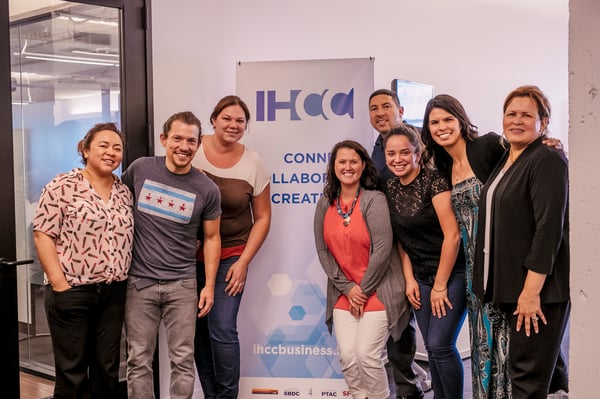June is Immigrant Heritage Month and we're celebrating by sharing the stories of immigrant entrepreneurs from our community. There’s no doubt that entrepreneurship is a journey, but for many who came to the United States from abroad, it’s been nothing short of an adventure. Here are their stories.
 Miguel Cervantes, who plays Alexander Hamilton in 'Hamilton', stops by 1871 to share his famous line: "immigrants - we get the job done!"
Miguel Cervantes, who plays Alexander Hamilton in 'Hamilton', stops by 1871 to share his famous line: "immigrants - we get the job done!"
Elon Musk, Jerry Yang, and Arianna Huffington; you know them as three industry titans who immigrated to the United States to build their businesses. And while you might easily recognize these names, there are many immigrant entrepreneurs whose stories often fly under the radar.
Take, for instance, Denise Umubyeyi. Umubyeyi is the Co-Founder of Five to Nine, a social wellness platform that works with companies to connect co-workers through meaningful experiences. Today, she runs an innovative business with fellow Notre Dame graduate Jasmine Shells, but her path here involved tremendous risk -- even for the most daring entrepreneur.
“I was born in Rwanda and had to leave because of the turmoil over there. We were in danger and we had to leave, so we became displaced refugees and lost everything.” - Denise Umubyeyi, Co-Founder, Five to Nine
Umubyeyi’s family fled to the Democratic Republic of Congo, where they stayed until ethnic violence forced them to flee once more. For Umubyeyi, it seemed as if her family would escape one country only to repeat the process a few months down the line. Yet, despite the challenges, Umubyeyi would come to learn one of the most valuable lessons in her life during this time.
Her father, who was taken out of school in the third grade, didn’t know how to read or write. He only learned how to read the Bible in his native language. However, Umubyeyi’s father had a gift for business -- a gift that would help his family persevere when they were forced to start over time and again.
“I would watch my father start a new business and I would imitate him by selling and trading something as small as sugar. I would learn from that, but I would also learn about the grit that comes with losing everything and starting over again -- and that’s something that all immigrants experience.” - Denise Umubyeyi, Co-Founder, Five to Nine
And that’s especially true for Hema Trukenbrod -- the CEO and Founder of PediaSource, a technology-enabled, pediatric healthcare services company based in Chicago. Trukenbrod came to the United States as a displaced immigrant in 1991 with just $500 to her name.
“I didn’t have much at all and as an immigrant, I wasn’t able to get help from any financial institutions. Yet when I look back, I realize that not having a safety net really prepared me for my entrepreneurial journey. The hustle that you have to undergo as an entrepreneur is very similar to the hustle that you have to undergo as an immigrant.” - Hema Trukenbrod, CEO and Founder, PediaSource
Trukenbrod has a point; after all, immigrants are twice as likely to become entrepreneurs as their native-born counterparts in the United States. Disha Gulati, CEO and Founder of Style545, a platform for clothing retailers that allows customers to engage in a targeted online browsing experience based on their preferences, budget, and inventory, credits her struggles as an immigrant as one of her greatest assets.
“Being an immigrant makes you very, very scrappy and that’s an important trait to have as an entrepreneur. Immigrants also have an advantage as entrepreneurs because they can apply a multinational and multi-demographic lens on their products, services, and offerings in a world that’s becoming more and more globalized.” - Disha Gulati, CEO and Founder, Style545
Yet even with its advantages, immigrants can still feel like outsiders and that’s no different in the startup community. And while one might think that assimilation is the key, Victor Abundis, COO and Co-Founder of Interpreter Tap, a mobile app that helps users of different languages connect through live interpreters, takes a different approach -- one that’s a little less, ‘when in Rome, do as the Romans do,’ and a little more, ‘when in Rome, do you.’
“Your culture is a huge part of what you bring into your business, but you can’t expect everybody to get it. I was born on the South Side and I’m a Latino. I make that a huge part of my business and a huge part of what I do. Do what you have to do to get that VC or investment, but never sacrifice who you are and try to make that part of your brand.” - Victor Abundis, COO and Co-Founder, Interpreter Tap
Abundis isn’t alone in that sentiment. Trukenbrod says that it’s advantageous for immigrants to highlight the qualities that make them unique even though it might not always seem like the right move.
“Shout out your differences from the rooftop and make them a part of your arsenal. As an entrepreneur, you’re always selling confidence and that means you have to sell yourself -- so don’t shy away from what makes you stand out. It’s true that some people won’t appreciate you for who you are, but you should just ignore them and focus on finding your flock.” - Hema Trukenbrod, CEO and Founder, PediaSource
And while many immigrant entrepreneurs are proud to highlight their differences, some struggle to connect with their heritage. After all, building a business doesn’t leave one with much time to celebrate their ancestry. Gulati recommends that busy immigrant entrepreneurs and founders should take every opportunity -- no matter how small -- to stay close to their their culture.
“You might be hundreds of miles away from where you are originally from and you’re going to be busy, so you really have to make an effort to stay connected to your heritage. I’m Indian and a lot of Indian holidays are not recognized here, so I try to get some friends together and celebrate them. Doing something like that can create special moments and help you keep your identity.” - Disha Gulati, CEO and Founder, Style545
For Abundis, who is Mexican-American, communication is a major factor when it comes to identity. He says both he and his family try to stay connected everyday through language.
“We’re all fluent in English but at home, we only speak Spanish. It’s not a rule or anything -- we just do it because you have to make a conscious decision to stay connected to your heritage. My heritage is around me everyday and it’s a blessing that we have many Latinos here in the United States. But if we want to build our community and preserve our heritage, then it’s in our own hands to keep ourselves and future generations culturally aware.” - Victor Abundis, COO and Co-Founder, Interpreter Tap
And whether they’re securing an investment, launching a new product, or simply finding time to connect with their culture, immigrant entrepreneurs have been the catalysts of innovation since our nation’s infancy. They’re the reason why you can walk down to the corner and choose between a sushi dinner or steak burrito, they’re the reason why you can Google virtually anything, they’re the reason behind the way our phones work and the way we charge them.
On this Immigrant Heritage Month, we celebrate all of our immigrant entrepreneurs -- we can’t wait to see what you come up with next.
1871 recently launched a partnership with Road to Status -- an online platform that provides digital tools and step-by-step guidance for immigrants seeking status -- 1871 members, alumni and their families will have free access to a platform that will guide and support them as they deal with a number of immigration issues and questions.
I Am An Immigrant is part of Welcome.us, a 501(c)(3) non-profit organization that coordinates Immigrant Heritage Month each June. I Am An Immigrant is an ongoing public awareness campaign to encourage Americans to share stories of their families’ immigrant heritage, and what it means to be an immigrant in America. Learn more by visiting www.iamanimmigrant.com and by following them on Facebook and Twitter.



